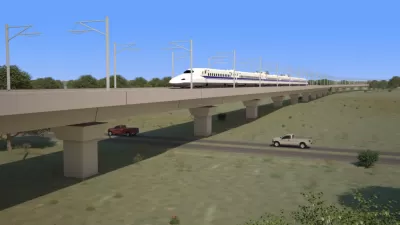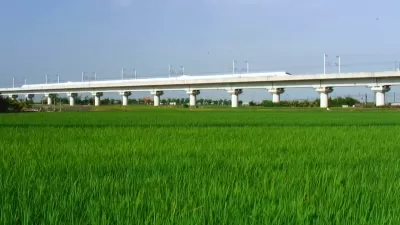The Dallas Business Journal provides in depth coverage on the current planning efforts behind two proposed high-speed rail station locations in Dallas.
"Two preferred sites for a potential new Dallas high-speed rail station are going through environmental impact studies, which could bring a rail station and billions of dollars in surrounding development to downtown Dallas," reports Candice Carlisle.
Carlisle reports on the proposed sites from the development side of the proposed station. Carlisle quotes Matthews Southwest President Jack Matthews (elected as the development partner on the station and the surrounding development) saying that the station and the resulting development would "a massive game changer."
Nicholas Sakeleris also reports on the announcement by drilling down on the details of the proposed sites.
"One site is 10 to 20 acres of undeveloped land west of Lamar Street that could accommodate the high-speed rail station, parking and space for future transit-oriented development. It's located west of Gilley's Dallas and the NYLO Dallas Hotel on the other side of the existing freight tracks. The bullet train would use its own tracks with overhead power lines passing through a tight-40-foot right-of-way corridor."
"A second proposed site would extend over Interstate 30 and includes a portion of the first candidate site and would be adjacent to the Dallas Convention Center."
Sakeleris also includes more detail about the Texas Central Railway's intentions for the station to become an iconic symbol of Dallas, as well as its potential to drive new development in the area and connect with the existing Dallas Area Rapid Transit System.
FULL STORY: Jack Matthews: Dallas high-speed rail station to be 'massive game-changer'

Planetizen Federal Action Tracker
A weekly monitor of how Trump’s orders and actions are impacting planners and planning in America.

Chicago’s Ghost Rails
Just beneath the surface of the modern city lie the remnants of its expansive early 20th-century streetcar system.

San Antonio and Austin are Fusing Into one Massive Megaregion
The region spanning the two central Texas cities is growing fast, posing challenges for local infrastructure and water supplies.

Since Zion's Shuttles Went Electric “The Smog is Gone”
Visitors to Zion National Park can enjoy the canyon via the nation’s first fully electric park shuttle system.

Trump Distributing DOT Safety Funds at 1/10 Rate of Biden
Funds for Safe Streets and other transportation safety and equity programs are being held up by administrative reviews and conflicts with the Trump administration’s priorities.

German Cities Subsidize Taxis for Women Amid Wave of Violence
Free or low-cost taxi rides can help women navigate cities more safely, but critics say the programs don't address the root causes of violence against women.
Urban Design for Planners 1: Software Tools
This six-course series explores essential urban design concepts using open source software and equips planners with the tools they need to participate fully in the urban design process.
Planning for Universal Design
Learn the tools for implementing Universal Design in planning regulations.
planning NEXT
Appalachian Highlands Housing Partners
Mpact (founded as Rail~Volution)
City of Camden Redevelopment Agency
City of Astoria
City of Portland
City of Laramie




























